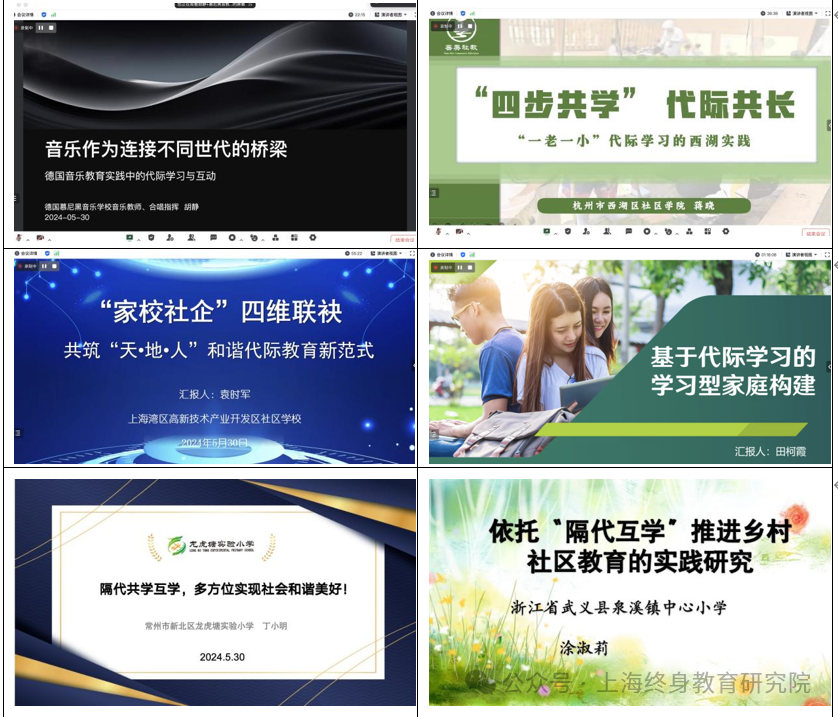East side of 7th Floor, No. 3663, North
Zhongshan Road, Shanghai, China, 200062
Tel: +86 21 6223 2322
www.smile.ecnu.edu.cn
On the evening of May 30, the academic salon "Intergenerational Learning Research: Practice Progress and Academic Dialogue (III)" was held through Tencent Conference, which was co-sponsored by the Shanghai Municipal Institute for Lifelong Education of East China Normal University, the Institute for Basic Education Reform and Development of East China Normal University, and the National Intergenerational Learning Research Alliance. The salon invited Hu Jing, a choral conductor and music teacher from the Munich Music School in Germany, Jiang Xiao, dean of the Community College of Xihu District in Hangzhou City, Zhejiang Province, Yuan Shijun, principal of the Community School of the Hi-tech Industrial Development Zone in Shanghai Bay Area, Tian Kexia, head of family education at the Open University in Lishui, Zhejiang Province, Ding Xiaoming, vice principal of the Experimental Primary School of Longhutang in the Xinbei District of Changzhou City, Jiangsu Province, Tu Shuyu, a senior teacher of the Central Primary School of Quanxi Town in Wuyi County, Zhejiang Province, to participate in the salon. Tu Shuli, a senior teacher at the center elementary school in Wuyi County, Zhejiang Province. The six sharing guests successively shared their keynote reports around the theme of intergenerational learning, "Music as a bridge connecting different generations - Intergenerational learning and interaction in German music education practice", "Four steps to learn together", "Intergenerational growth - "One old, one young", and "One old, one young". -Four Steps to Intergenerational Learning and Intergenerational Growth: The Practice of Intergenerational Learning of "One Elder, One Child" in Xihu", "The New Paradigm of Harmonious Intergenerational Education in the Four Dimensions of Home, School, Society and Enterprises - Shanghai Bay Area Hi-Tech Community School". The New Paradigm of Harmonious Intergenerational Education - Shanghai Bay Area Hi-Tech Community School", "Construction of Learning Family Based on Intergenerational Learning", "Exploration and Practice of Intergenerational Learning and Mutual Learning to Achieve Harmonious and Wonderful Society in Various Aspects", and "Practical Research on Promoting Rural Community Education Relying on Intergenerational Learning and Mutual Learning". The salon also invited Principal Zhang Beilei of Tinglin Primary School in Jinshan District, Shanghai, the rotating chair school of the National Intergenerational Learning Research Alliance, to be the moderator, and Principal Xiong Jun of Guangzhou Open University, Professor Ouyang Zhongming, Director of the Department of Education and Dean of the College of Education of Jiangxi Normal University of Science and Technology, and Associate Professor Ma Lihua of the Department of Education of East China Normal University, to be the reviewing experts. President Xiong said, "With the development of the times, the cultivation of imagination plays an important role in the overall improvement of education, including the high-quality development of intergenerational education, and will also be beneficial to the realization of lifelong learning." Prof. Ouyang pointed out that "the common needs between intergenerational subjects, i.e. the point of connection of interests, is the most important factor in the development of intergenerational learning programs". According to Prof. Ma, "intergenerational learning also needs to consider its potential risks, such as the problem of parental absence, the problem of intergenerational conflicts/tensions, and the problem of over-reliance on the experienced guidance of elders which limits the independent thinking/innovation ability of the younger generation".

At the end of the event, Prof. Li Jiacheng, Executive Vice President of the Shanghai Municipal Institute for Lifelong Education of East China Normal University, delivered a concluding speech, pointing out that intergenerational learning is still a new thing in the context of today's educational practice and theoretical research. In a certain sense, it may change quite a lot of our original forms of basic education, geriatric education, family education, including some forms of workplace learning. He suggests that research on intergenerational education should focus on the following three aspects in the future: firstly, to continuously enhance the sensitivity to the benefits of education; secondly, to deepen the research on the quality of learning; and thirdly, to pay constant attention to the pursuit of the sense of value and meaning of life. It is understood that research institutes such as the Shanghai Municipal Institute of Lifelong Education and senior universities, primary and secondary schools across the country are continuing to promote the development of intergenerational learning practices and theoretical research, and the fourth online academic salon is already under preparation, and the annual meeting of the "National Intergenerational Learning Research Alliance" will be held soon.